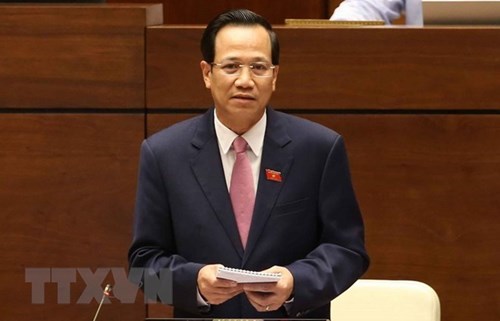Replying to representative of the central city of Da Nang Nguyen Thi Kim Thuy on measures to improve the quality of guest workers and tackle current problems in the field, Minister Dung said that Vietnam aims to send about 1 million people to work and study abroad each year.
So far, about 500,000 Vietnamese labourers are working in other countries. In 2017, 134,000 workers were sent to work abroad, equivalent to 128 percent of the set target, he noted.
    |
 |
|
Minister of Labour, Invalids and Social Affairs Dao Ngoc Dung |
Along with the resumption of cooperation with the Republic of Korea after a four-year hiatus, Vietnam has for the first time signed a national-level labour deal with Japan, giving a boost to labour export. Each year, the guest workers sent home about 3 billion USD.
However, Dung said that in promising markets with high income, especially the RoK, many workers refused to return home, with the highest annual ratio recorded reaching 55 percent, which was then reduced to 33 percent. For that reason, the RoK side stopped recruiting Vietnamese labourers for four years.
The RoK then requested not recruiting people from 12 provinces and 58 districts with over 30 percent of labourers staying in the RoK illegally after finishing their contracts. In 2018, the number of such districts dropped to 49, he said.
Regarding the Saudi Arabian market, Minister Dung noted that the country is hosting about 9,000 labourers, most of whom work as housemaids. Although the market requires simple skills from labourers, this is a risky market with many latent problems, he said.
Deputy Duong Tuan Quan from southern Ba Ria-Vung Tau province showed his worry about the illegal formation of many labour export agents and companies to cheat people.
Inspections in 2016 and 2017 showed that among 60 examined companies, 42 operated illegally.
Minister Dung said that together with giving favourable conditions for labourers to work abroad, the ministry has backed labour export companies in expanding their market. Recently, such businesses have boomed in number.
He admitted the problem mentioned by deputy Quan, adding that the ministry has applied many measures to deal with it.
The Government and the Prime Minister issued two instruction documents, assigning specific ministries and sectors to handle shortcomings facing Vietnamese guest workers.
The MOLISA has also held a dialogue with 282 labour export businesses to discuss ways to remove obstacles encountering them, while asking the firms to publicize information of the demand, incomes, fees and job description in each market, he said.
The minister added that the MOLISA has made clear the fees for each market. The fee is free in the RoK and Japanese markers, he said.
Dung clarified that the ministry has inspected 51 labour export firms and discovered 338 violations, collecting a fine of 3 billion VND in 2017, revoking the business licences of 5 enterprises and suspending the operation of 25 firms.
In the coming time, the ministry will continue working closely with localities to keep a close watch on operations of the businesses, while making fee more transparent.
It will withdraw the licence of any businesses which violate law, especially failing to ensure rights of their labourers abroad, he stressed.
Source: VNA